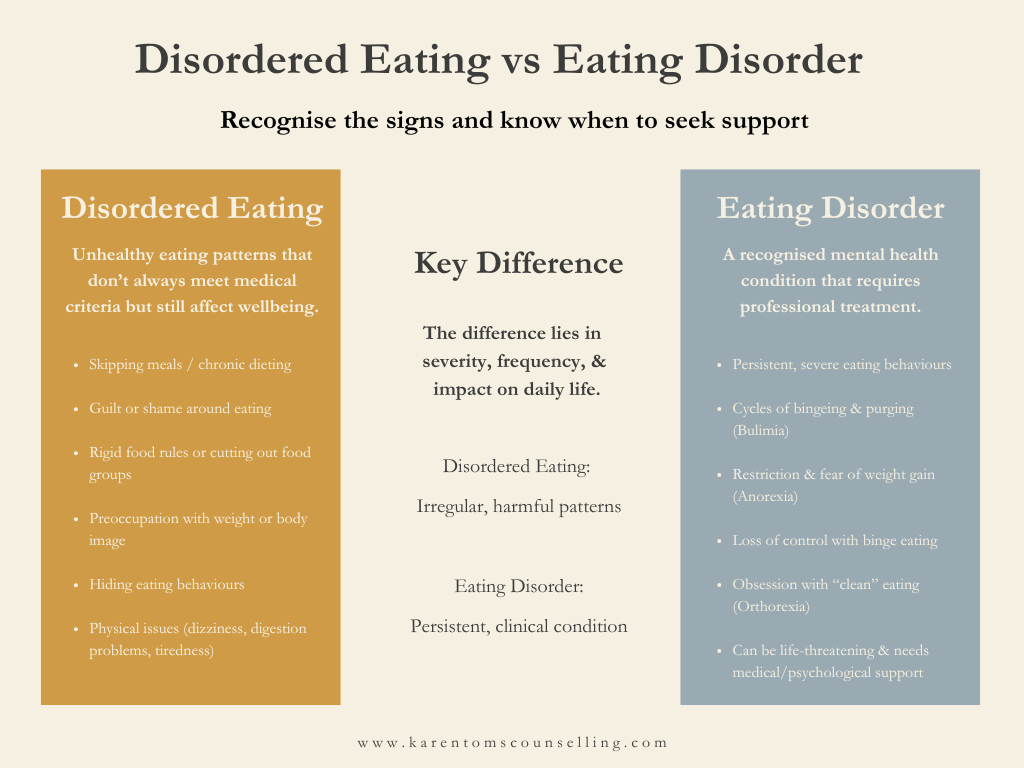A lot of people struggle with food, body image, and eating habits during their lives. Sometimes this happens for a short period, while for others it continues for many years. In 2019, around 16% of adults in England were estimated to have an eating disorder1 , and these numbers are likely even higher today. It’s common for people dealing with eating issues to do so in secret and avoid seeking help. Many become skilled at hiding their struggles, which means it is not always easy to know when these difficulties cross the line into something more serious. You may have wondered: what is the difference between disordered eating and an eating disorder?
Understanding this distinction is important. It can help you recognise whether you or a loved one may benefit from support. Whether your challenges fit into a clinical diagnosis or not, counselling for disordered eating and eating disorders can provide a safe space to explore what you are experiencing. The support of someone with experience in eating issues can be an effective step toward healing your relationship with food and yourself.
What is Disordered Eating?
Disordered eating refers to irregular, unhealthy, or distressing eating patterns that do not always meet the full criteria for an eating disorder.
Some common signs of disordered eating include:
- Skipping meals or chronic dieting
- Emotional eating in response to stress, sadness, or boredom
- Frequent guilt or shame around eating
- Following rigid food rules
- Cutting out food groups, bingeing, or excessive compensatory exercise
- Preoccupation with weight or body shape that affects daily life
- Hiding eating behaviours or finding it difficult to eat with others
- Physical issues such as digestive problems, dizziness, tiredness, or poor circulation
While disordered eating may not qualify as a formal diagnosis, it can still have a serious impact on wellbeing. There is an increased risk of developing a full eating disorder if left unaddressed, and other mental or physical health issues can also develop.
What is an Eating Disorder?
An eating disorder is a recognised mental health condition, often with serious physical consequences, that requires professional treatment. Eating disorders can affect anyone — regardless of age, gender, or background. In 2019, 1.7 million adults in England were thought to be affected by an eating disorder2, and since then, COVID-19 and other factors have likely increased those numbers.
There are several different eating disorders, but the most common include:
- Anorexia Nervosa – Restricting food intake, intense fear of weight gain, and distorted body image.
- Bulimia Nervosa – Cycles of binge eating followed by compensatory behaviours such as purging, excessive exercise, or fasting.
- Binge Eating Disorder – Repeated episodes of consuming large amounts of food, often quickly and in secret, with feelings of loss of control.
- Orthorexia – An unhealthy obsession with eating only foods considered “pure” or “clean,” which can lead to anxiety and nutritional deficiencies.
The most prevalent eating disorder in the UK is actually “other specified feeding or eating disorder” (OSFED). In this case, a person’s symptoms do not fit neatly into one category but are still significant. For example, someone may meet many criteria for anorexia but not be underweight, or a binge eater may not binge often enough to meet the full diagnostic threshold. Eating disorders are formally assessed by a medical professional, usually initially a GP, against a set of clinical criteria. Details of these can be found on the NICE website.
When Does Disordered Eating Become an Eating Disorder?
The difference often lies in the severity, frequency, and impact on daily life. When eating behaviours dominate your thoughts, damage your physical or mental health, and interfere with your ability to live fully, they may have developed into an eating disorder.

Key Differences Between Disordered Eating and an Eating Disorder
While the two terms are related, there are some important distinctions:
- Disordered Eating:
Symptoms may involve unhealthy habits like those outlined above, but these thoughts, feelings, and behaviours are not always constant or extreme. Their severity can fluctuate with stress, life changes, or social influences.
- Eating Disorder:
Symptoms are persistent, severe, and often life-threatening. Eating disorders are recognised medical and psychological conditions that require professional treatment, which may include talking therapy, nutritional guidance, medication, and ongoing support.
It is important to note that many eating disorders remain undiagnosed. Of the estimated 1.7 million affected in 2019, fewer than 20% received a formal diagnosis3. This is partly because sufferers may feel shame or stigma and avoid being fully open with professionals. In addition, GPs and other health practitioners often lack specialist knowledge in eating disorders, which can delay diagnosis and treatment.
Why Counselling Helps with Both
You don’t need to wait for a diagnosis to seek help. Counselling for disordered eating can prevent unhealthy patterns from escalating, while eating disorder counselling provides specialised support for recovery. Both issues are complex but can benefit from therapy with a counsellor trained in eating difficulties.
In a safe and non-judgmental space, therapy can help you:
- Understand the root causes of your relationship with food
- Challenge unhelpful beliefs and behaviours
- Develop healthier coping strategies
- Rebuild self-esteem and body confidence
- Move towards long-term recovery and wellbeing
When to Seek Support
If worries about food, weight, or body image dominate more than you’d like, it may be time to reach out. People often contact me when they feel stuck, lost, or uncertain about how to change — especially if these struggles have felt like their “normal” for a long time.
You don’t need a formal diagnosis to benefit from counselling for disordered eating. In fact, seeking early support can make recovery easier. By reaching out now, you may prevent symptoms from worsening and limit both the mental and physical impact. It can be helpful to talk with a counsellor to assess the severity of your disordered eating, especially if you have been suffering in secret. Through therapy, you can build self-worth, better understand your eating issues, and make positive, supported changes.
Begin Your Journey Today
Whether you are experiencing disordered eating patterns or living with a diagnosed eating disorder, you don’t have to go through this alone. The idea of talking to someone may feel daunting, but I completely understand this — I have my own lived experience of an eating disorder.
My focus is to create a supportive space where you feel comfortable and encouraged to return each session. Specialist counselling for eating disorders and disordered eating can help you change your relationship with food, strengthen your self-esteem, and take steps toward lasting recovery.
If you’ve been asking yourself, “What is the difference between disordered eating and an eating disorder?” the most important thing to know is that you don’t need to wait for a diagnosis to seek help. Reaching out now could prevent your struggles from worsening and help you feel calmer, more balanced, and more in control of your life.
If you’re ready to explore how counselling could support you, I am happy to arrange a confidential, no-obligation consultation. Please get in touch.
FAQs
What is the difference between disordered eating and an eating disorder?
Disordered eating involves unhealthy habits that may come and go, while eating disorders are persistent, severe conditions requiring professional treatment.
Can disordered eating turn into an eating disorder?
Yes. Left unaddressed, disordered eating can escalate into a full eating disorder over time.
Do I need a diagnosis to get counselling for eating issues?
No. You can seek counselling for disordered eating or eating disorders without a formal diagnosis.
How does counselling help with disordered eating?
Therapy provides a safe space to explore your relationship with food, build healthier coping strategies, and prevent symptoms from worsening.
1, 3 NHS Digital (2020). Health Survey for England 2019. https://files.digital.nhs.uk/30/533217/HSE19-Eating-disorders-rep.pdf
2 All Party Parliamentary Group (APPG) (2025). The right to health: People with eating disorders are being failed. Retrieved from
https://www.pslhub.org/learn/patient-safety-in-health-and-care/mental-health/eating-disorders/the-right-to-health-people-with-eating-disorders-are-being-failed-22-january-2025-r12651 [Accessed 24/09/2025]





